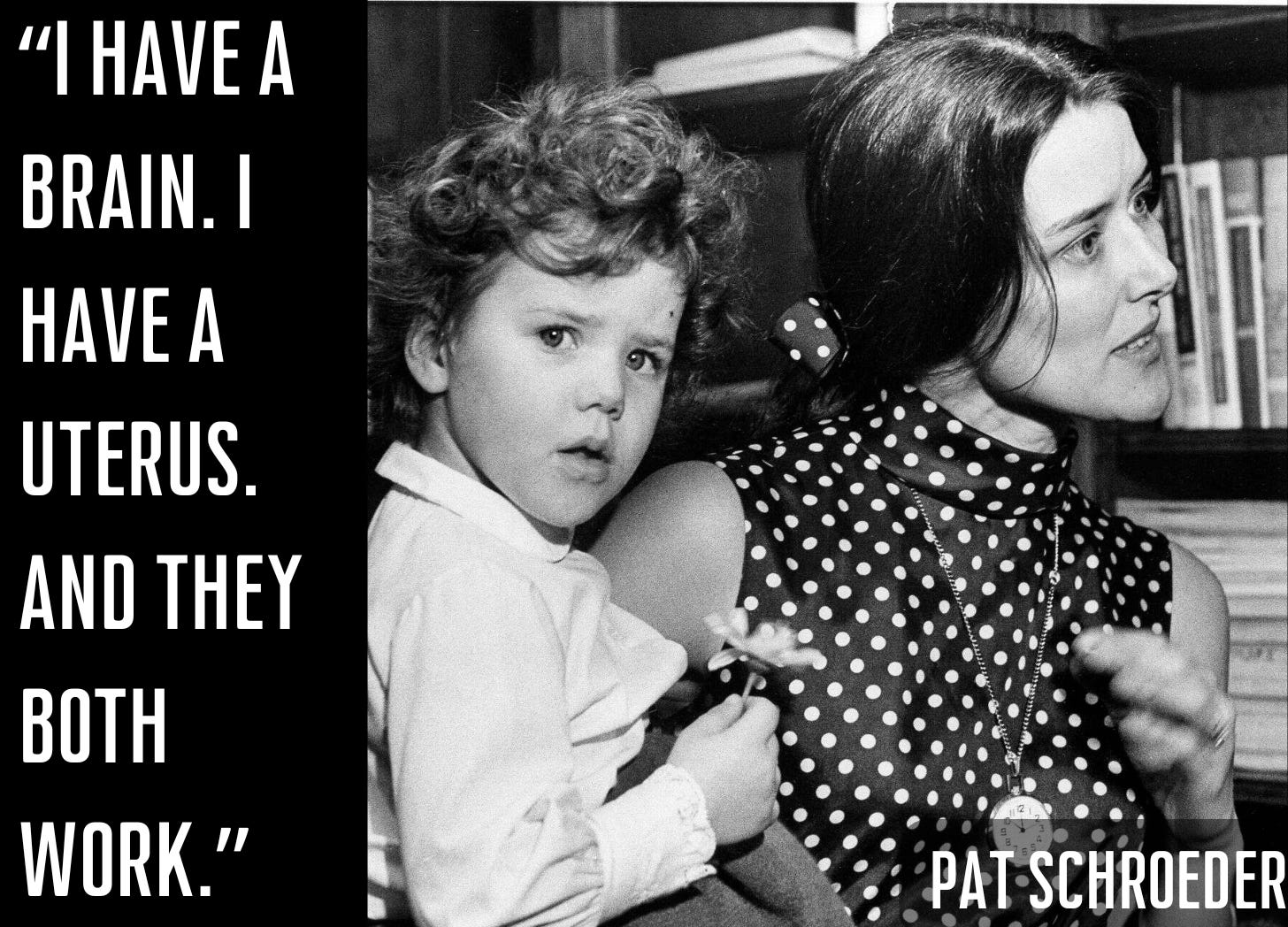Happy almost Mother’s Day!
I love that in recent years this holiday has become an occasion to celebrate all the moms out there, biological, spiritual, adopted, or otherwise.
And, if you’re like me, you probably believe your mom, whoever she is, would make a great president. (Love you, Mom!)
Yet, there has never been a woman president of America, let alone a mom.
This is odd since if we lived in a genuinely representative democracy, surely we would have had one by now. After all, over 50% of Americans are women, and over 80% of American women between the age of 40 and 44 are mothers.
And yet, only 37 congresspeople - 7% - are mothers. Only 3, yes, 3 Senators are mothers of minor children. And obviously, neither the president nor the vice president are mothers. Even State Houses have a dearth of those who have given birth, with mothers of children under 18 representing a paltry 5.3% of all state legislators. Unbelievable.
So why are mothers so underrepresented in the halls of power?
Perhaps they lack the ambition to serve.
Made you laugh, I know. Of course, that’s not why.
Instead, a whole cadre of issues deter and prevent mothers from running for and winning elected office.
According to Vote Mama, a non-profit dedicated to getting more moms elected, childcare obligations are among women’s biggest considerations when deciding whether to run for office. All too often, this is what holds them back from running.
Not only are women expected to do a disproportionate amount of domestic labor within heteronormative relationship structures, but candidates who are mothers also lack access to affordable, reliable childcare.
The solution?
Allow candidates to use campaign funds for childcare. Removing this frequently insurmountable barrier of entry enables parents, and especially mothers, to run for office - and win.
So, too, are mother candidates plagued with the age-old question, “Who will take care of the kids while you’re running?”
As Mary Hayashi, writes in her book Women In Politics, “We singularly view women as caregivers. So when a woman with children steps on the campaign trail, we immediately wonder who is looking after her children.”
This prejudicial bias impacts a candidate’s viability. As Hayashi continues, “She is seen as a horrible mother because she plans to have others - even Heaven forbid, the children’s father - look after them. Or, if she intends to remain closely involved in her children’s lives, she is deemed unfit for public office because she cannot possibly do the job while also caring for children.”
This unfair and unfounded stereotype creates a chasm of likability and trustworthiness that most mother candidates cannot bridge. Meanwhile, no one wonders who is taking care of the children if the father of young children decides to run. Instead, he benefits from his status and his (presumably) female partner’s free labor, as such candidates are often seen as dependable family men.
Combating this double standard requires both personal and collective action. Confronting one’s own biases - and checking them - is now, as ever, a political act. Together, we can elevate the stories of mothers in politics while supporting mother candidates to normalize the narrative of women with children running for office.
Perhaps the most significant structural hindrance to getting more mothers elected is winner-take-all elections in which voters can choose one candidate and one candidate only. Such elections favor partisan politics, wedge issue campaigns, and candidates who fit the “accepted model” of a politician - white men.
Alternatively, according to RepresentWomen, a non-profit dedicated to getting more women into elected office, Ranked Choice Voting demonstrably favors “non-traditional” candidates - including mothers.
How?
FairVote breaks ranked choice voting like this:
Voters can rank candidates in order of preference: first, second, third, and so forth. If your first choice doesn’t have a chance to win, your ballot counts for your next choice.
In such a system, political parties and voters are less likely to view alternative candidates as “spoilers,” a change that helps bridge the electability divide that most mother candidates face. This has also resulted in different recruitment strategies by political parties since the definition of a viable candidate has changed.
Research by RepresentWomen also shows that voters are likely to vote for women in Ranked Choice Elections, Which is a game changer.
This Mother’s Day, skip the flowers. Give moms your vote instead.
For a bit of inspiration, here are 5 moms who bucked the system, ran for office, and won.
Yvonne Brathwaite Burke didn’t just walk into the halls of Congress; she broke barriers on her way in and never stopped clearing the path for others. Elected in 1972, Burke was the first Black woman to represent California in the U.S. House of Representatives. A formidable presence from the start, she leveraged her experience in the California State Assembly and national recognition in the Democratic Party to secure a rare early appointment to the powerful Appropriations Committee.
But Burke’s history-making wasn’t confined to committee rooms. She became the first sitting Member of Congress to give birth while in office, sparking both media curiosity and cultural reckoning. With grace and grit, she navigated the dual roles of the legislator and a new mother at a time when working mothers, especially in government, were still seen as novelties. Reporters questioned her every move: Who feeds the baby? Who drives her to work? Burke answered by simply living her truth and letting them watch.
“I have a brain. I have a uterus. And they both work,” Congresswoman Pat Schroeder defiantly declared when asked how she could serve in public office and be a mother. Her wit, tenacity, and unapologetic feminism never failed to break barriers for women in government. Elected in 1972 as one of just 14 women in the House, she became the first woman to represent Colorado in Congress and quickly gained national attention for challenging the status quo. A champion of family leave, military reform, and reproductive rights, Schroeder helped pass the Family and Medical Leave Act and fought tirelessly for gender equity in the military and workplace. Known for her sharp humor, she refused to shrink herself to fit outdated expectations. In 1987, Schroeder made headlines when she explored a presidential run, demonstrating that women could and should aim for the highest office. Her 24-year career reshaped what was possible for women in politics and left an indelible legacy of courage, compassion, and conviction.
Senator Tammy Duckworth is a certified badass. A combat veteran who lost both legs in Iraq, Duckworth became the first Thai-American woman elected to Congress and later the first senator to give birth while in office. In 2018, she made history by bringing her newborn daughter onto the Senate floor—an act that humanized motherhood in the halls of power and led to a rule change allowing infants in the chamber. A tireless advocate for veterans, working families, disability rights, and reproductive justice, Duckworth brings lived experience and unflinching determination to every fight. Her story is not just one of survival but of transformation—shattering barriers for women, mothers, and disabled Americans while proving that leadership grounded in empathy and grit is precisely what democracy needs to thrive.
Former Congresswoman Ileana Ros-Lehtinen made history as the first Latina and first Cuban American elected to the U.S. Congress, where she served Florida’s 27th district for nearly three decades with integrity and bipartisan conviction. A trailblazer in every sense, Ros-Lehtinen was known for crossing party lines to defend human rights, support LGBTQ+ equality, and advocate for the marginalized. As a Republican, she defied political norms by becoming one of the earliest members of her party to endorse marriage equality and transgender rights—stances informed, in part, by her own family. Ros-Lehtinen is the proud mother of a transgender son. She has spoken openly about the importance of acceptance and advocacy, using her platform to elevate the voices of LGBTQ+ youth and families. Her courageous leadership and commitment to inclusion remain a model for principled politics, reminding us that accurate representation is rooted not in ideology but in empathy, experience, and the courage to lead with heart.
Congresswoman Brittany Pettersen broke the internet when she cradled her baby son in her arms as she cast a crucial vote on the House floor against the vile Republican-authored multi-trillion-dollar budget deal. Congressional Republicans had recently passed a House rule prohibiting members from voting by proxy - thereby making it nearly impossible for congresspeople like her who had just given birth to make their - and their constituents’ voice heard.
In an interview, Petterson blasted Republicans, saying, “How is it not discriminatory to tell a duly elected member of Congress that she can’t vote because she gave birth to a child?”
Unable to vote remotely due to congressional rules, the Colorado Democrat flew across the country to oppose a multi-trillion-dollar budget deal, which narrowly passed in the House of Representatives.
Petterson’s political career and advocacy are rooted in personal experience and a deep commitment to public service. Raised by a single mother who struggled with substance use disorder, Pettersen has been a fierce advocate for behavioral health reform, expanding access to treatment, and addressing the opioid crisis with compassion and urgency. Elected to the Colorado Senate after serving in the House, she has championed legislation on education equity, affordable housing, and paid family leave. In 2023, as a newly elected Member of Congress, Pettersen joined a growing cohort of women redefining what leadership looks like in Washington. A working mother, she brings policy expertise and caregiving experience to the national conversation about work, equity, and family. Pettersen’s career is a testament to the power of resilience and representation and how lawmakers with firsthand knowledge of systemic challenges can craft bold, transformative solutions.
Nevada State Senator Nicole Cannizzaro embodies the phrase “do it anyway.” Very little gets in this woman’s way. And if it does, she busts the door down. As the first woman to serve as Nevada Senate Majority Leader, Cannizzaro has championed landmark health care, education, and workers’ rights policies. She led the charge to pass paid family leave, expand access to affordable prescription drugs, and protect reproductive rights, cementing Nevada’s role as a national leader in progressive policymaking. A working mother and former Clark County prosecutor, Cannizzaro understands firsthand the challenges of balancing career, caregiving, and public service. Her lived experience brings authenticity and urgency to her legislative work, particularly in advancing policies that empower women and families. Under her leadership, Nevada became the first state in U.S. history with a female-majority legislature, proving that when women lead, government better reflects and serves the people. Senator Cannizzaro continues to fight for a more equitable, inclusive, and resilient future for all Nevadans.











I didn't know so much of this! Tammy Duckworth blew my mind when she brought her daughter out onto the floor of the Senate, but these other women are equally inspiring. Thanks as always for educating, enlightening and uplifting us through your fantastic work!
👏👏👏👏👏👏 100:97